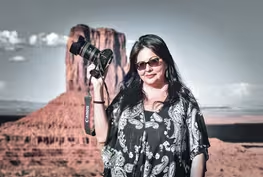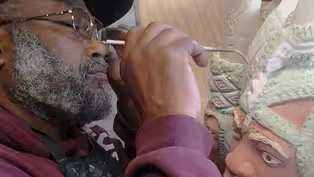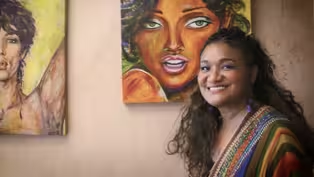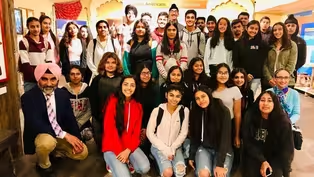KVIE Digital Studios
TeAda Productions | Preserving Culture Through Art
6/22/2021 | 6m 8sVideo has Closed Captions
TeAda Productions extends an outlet of service, education and creative courage.
Through storytelling and live performance, TeAda Productions extends an outlet of service, education and creative courage.
Problems playing video? | Closed Captioning Feedback
Problems playing video? | Closed Captioning Feedback
KVIE Digital Studios is a local public television program presented by KVIE
Episode funded in part by the California Arts Council, a state agency.
KVIE Digital Studios
TeAda Productions | Preserving Culture Through Art
6/22/2021 | 6m 8sVideo has Closed Captions
Through storytelling and live performance, TeAda Productions extends an outlet of service, education and creative courage.
Problems playing video? | Closed Captioning Feedback
How to Watch KVIE Digital Studios
KVIE Digital Studios is available to stream on pbs.org and the free PBS App, available on iPhone, Apple TV, Android TV, Android smartphones, Amazon Fire TV, Amazon Fire Tablet, Roku, Samsung Smart TV, and Vizio.
Providing Support for PBS.org
Learn Moreabout PBS online sponsorshipMore from This Collection
Discover how the Punjabi American Heritage Society is using art as a resource in helping build connection, while gaining understanding and preserving culture.
Pamela J. Peters | Preserving Culture Through Art
Video has Closed Captions
Multimedia Artist Pamela J Peters describes her work as Indigenous Realism. (6m 42s)
Akinsanya Kambon | Preserving Culture Through Art
Video has Closed Captions
Artist Akinsanya Kambon hopes through his art to inspire others. (7m 5s)
Artist Dr. Monica Crooks | Preserving Culture Through Art
Video has Closed Captions
Meet artist and dentist Dr. Monica Crooks. (6m 4s)
Punjabi American Heritage Society
Video has Closed Captions
See how the Punjabi American Heritage Society is preserving culture through art. (5m 8s)
Providing Support for PBS.org
Learn Moreabout PBS online sponsorship♪♪ Ova: TeAda is all about elevating the refugee and immigrant experience.
The work that we do is very important because it really is a way to give the community an opportunity to find pride.
Marinda: Through storytelling and live performance, TeAda Productions extends an outlet of service, education and creative courage... rooted in preserving the voices of those who have been silenced or unheard for far too long.
(Man speaking in foreign language) Leilani: Uh, OK I don't know what you just said.
Leilani: primarily why I wanted to find, uh, start the theater TaAda productions, um, is because I wanted a place to be able to tell the stories that aren't being told on most of American stages.
And I just was getting really frustrated at the limited opportunities, not just as, um, as an actor, but also as a writer and our producer.
Ova: I mean, a lot of the communities we work with don't have that chance to be able to see themselves in a way that is honest and truthful, the communities that we work with don't have the space don't, don't usually have the space to be able to present themselves in an authentic way.
I'm Lao, American Leilani is a mixed heritage.
And even to, to create, we had to create our own stories.
We had to work and create our own pathways.
Being in theater is not something that is the, the normal track.
Uh, and so, um, to find a way to elevate and use the platform of theater to share our experience and stories is important.. Leilani: ...so we actually have to go in the community and make people comfortable with theater.
Um, I'll give you an example.
When we first start our workshops, we don't call them theater workshops.
We call them storytelling workshops... we actually ask them to tell the story on their feet.
Tell the story with your body.
Tell the story with your voice.
(Cast shouting) Ova: The creative process for TeAda is we're very, um, what we call ensemble base.
So we're very collaborative.
We work with various different communities... With an equal footing with the community.
And I think that's, what's important.
It also creates transformative experiences for the participants, um, for the cast members who are in the place where we do develop them to that point.
And I think that's something that is very very challenging because in theater, sometimes many of the, uh, theater companies would just come in and they're very, uh, more colonial.
They would come in and just kind of take the story and then kind of shape it without any collaboration with the community... Marinda: Simply sharing a story can spark something so profound, giving guidance, honor, understanding and perspective on the past.
It can also have a transformative impact on the future.
Leilani: From our plays and not just masters of the current, but from the plays we do.
There's many different levels of transformation that people get when they come to our shows.
And for some, it's seeing their own stories on stage for the first time.
And for others, it's realizing that the stories are similar and that they, even if they're not Micronesian, they can see.
what, um, the Micronesians are going through as a reflection of what they themselves may have gone through, so we've had a lot of discussions with people from many different communities saying.
"That's just like in my community."
There's this whole sense of, um, negotiating both assimilating or retaining your culture and how that's a continual battle.
(Cast chanting in foreign language.)
Leilani: There's always a necessity for our plays to educate in an entertaining way, in a way that isn't just, you know, exposition like so we try to find a way to engage the audience and have them both laugh and cry, but at the same time, learn something.
Marinda: Through every production TeAda creates an opportunity to preserve and honor traditions, build growth, gain self-care, start conversations and transform communities.
Ova: When you come to a production of TeAda, you will see number one, diversity, so much diversity in terms of people, uh, in terms of, uh, faces.
Um, like for example, our current, uh, production that we had just done was a community sharing where we work with, uh, an organization called program for torture victims.
Many of them are from different, um, African uh, countries like Uganda and Cameroon.
And so it's an opportunity for them to really explore what has happened to them and why they're here.... Leilani: So for me, it's more than representation.
It's not just about getting our bodies onstage as people of color.
It's about making sure we're telling authentic stories and not just fetishize stories or fantasies for the white gaze.
And that's why we do our work is we want to get the stories from the sources of the people, um, and help give them a platform for those stories to be told authentically and not watered down in a way that is just marketable, but in a way that offers an opportunity for conversation and, um, and dialogue and hopefully change.
"Yeah"
Support for PBS provided by:
KVIE Digital Studios is a local public television program presented by KVIE
Episode funded in part by the California Arts Council, a state agency.

















